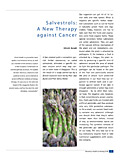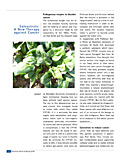|
||||||||
|
Salvestrols: A New Therapy against CancerIt has created quite a sensation: special herbal substances, so called salvestrols, stimulate a specific human enzyme which may stop cancer or even make it disappear. This is the result of a study carried out by a British research team led by Prof. Dan Burke and Prof. Gerry Potter.Ulrich Arndt Our organism can get rid of its tumor cells and heal cancer. What is required are specific herbal bioactive substances such as can be found in naturally grown fruits and vegetables. Today, however, one has to take care that the fruits and vegetables come from organic farms. Those special secondary herbal substances are called salvestrols. They are part of the natural defense mechanism of the plant and are immediately produced when the plant is attacked by pathogens. If, for instance, a fruit is attacked by a fungus, the plant resists by producing a specific kind of salvestrol around the area of attack to fight this particular pathogen. The pathogen can be found in the peel of the fruit and particularly around the area of attack. Such protective substances in our food help our organism to defend itself, and in particular against cancer. If we take in enough salvestrols a tumor may even disappear - by no other than natural food. The negative side, however, is that conventionally grown vegetables, fruits and herbs are treated with artificial pesticides and thus produce only very little protective substances. As a result, our current food hardly contains any salvestrol, although one should think that they’d rather contain more than before, instead of less, as environmental toxins are increasing. The synthetic remains of the pesticides put additional strain on our body. The only way out is to buy exclusively organic food or take nutritional supplements with salvestrol extracts. Endogenous enzyme to dissolve cancer The sensational insight into the direct link between healthy nutrition and the healing of cancer was triggered by a discovery made by cell researchers. In the 1990s, Professor Dan Burke and his research team at Aberdeen University discovered a basic mechanism showing how our body defends itself against cancer. The key to this phenomenon was a new enzyme that biologists found in tumor cells which they called CYP1B1. If it is activated, the body expels toxic metabolites and exogenous toxins such as carcinogenic substances, pesticides, environmental toxins and similar products. What is extraordinary is that the CYP1B1 enzyme can only be found in cancer cells and in cells in a preliminary stage of cancer, but never in healthy cells. By verifying the CYP1B1 enzyme in cells, it may become possible to detect pre-cancer cells early on. Professor Burke and his team believe that the enzyme is activated in the “degenerated” cells as a kind of self-healing mechanism in order to decompose and eliminate cancer cells and toxins. The enzyme, however, needs “a partner” to become active against the tumor cells. In cooperation with Professor Gerry Potter at Montford University of Leicester, Dr. Burke first developed a synthetic substance which transformed the CYP1B1 enzyme into an “anti-cancer therapist”. But then, Dr. Burke remembers, they thought that similar partner links might be found in our food, which is then transformed into anti-cancer therapies by CYP1B1. Our body produces roughly several thousand cancer cells a day which, however, are disintegrated quickly and efficiently and thus do not lead to any tumor formation. In 2002, they reached a breakthrough: resveratrol, a natural phytoestrogen that can be found in red grapes, red wine, peanuts, currents, plums, tomatoes and pines etc. reacted with the enzyme CYP1B1. But the first euphoria was soon replaced by disappointment, as it turned out that fewer and fewer cancer cells were killed as a result of an increase of the dosage to over 200 milligrams. More food had to be analyzed to find better partner substances ... Salvestrols to reduce cancer „Since then we have detected over fifty partner substances in plants“, says Prof. Burke. They include certain bioflavonoids (plant pigments), carboxyl acids and so-called stilbene (phytoestrogens) and stilbenoids (including resveratrol) which naturally occur in vegetables, herbs and fruits. Many traditional healing herbs also show a high concentration of salvestrols. What is common in these highly different chemical compounds is that they kill cancer cells after having been activated by the CYP1B1 enzyme. To underline their common quality, Burke grouped all the new herbal substances into a new category called “salvestrols” (from Latin: salvere = retten). Another common feature is that plants produce salvestrol substances especially to resist an acute attack – for example of molds, bacteria, viruses, insects and ultraviolet light. For this reason one can find salvestrols mainly in the peels of fruits, in seeds, leaves and in the outer parts of the roots, i.e. in such parts of the plant which are directly exposed to stress factors. Depending on the type of stress a plant suffers it produces different salvestrol substances in terms of active forces, assimilation by humans, durability, sensitivity to heat and water, or liposolubility. Herbal substances with a bitter or sharp flavor contain a particularly high level of salvestrol, but ironically such flavor substances have been eliminated in vegetables by cultivation so that they can only produce little salvestrol for protection. Plants with a higher amount of salvestrol (from organic farming) include, for example, artichokes, asparagus, watercress, roquette, spinach, pumpkin, olives, currents, apples, rose hips, strawberries, sage, mint, dandelion, plantain, holy thistle, agrimony, vervein and rooibos tea (see box below). In recent years, researchers in Britain have started to study traditional fruits and vegetables, which naturally contain more salvestrols.” To increase protection against cancer it is recommended to consume more salvestrols by adding organically grown vegetables, fruits and herbs to our menu. The vegetable should be prepared in a steamer or wok to preserve the salvestrols. Although they are rather heat-resistant, they are leached out by boiling water. Today, special concentrates are also available made from organically grown vegetables and fruits which have been selected based on their high level of salvestrol. A score ranging from 350 to 2000 points illustrates the level of salvestrol in each capsule. The minimum quantity which is recommended on a daily basis ranges at 100 points. To achieve a therapeutical effect, however, an average person weighing between 77 and 84 kg should take 2000 to 4200 points a day. People suffering from severe diseases should ideally combine the salvestrols with a multivitamin preparation and additional micronutrients such as biotin, niacin, vitamin C, magnesium and selenium. “Together with an increased intake of oxygen through physical exercise the salvestrols can make an important contribution to restoring the health of cancer patients”, underlines Prof. Burke. The scope of salvestrols is amazing: in lab tests the herbal substances destroyed tumor cells of diverse cancer cells of the brain, breast, prostate, rectum, ovary, testicles and lung. Practical tests carried out in cancer patients proved equally encouraging. The sensational results have shown a highly efficient way towards self-healing and cancer prophylaxis with nothing but organic vegetables and fruits plus additional nutrients containing salvestrols.
|
Für weitere Informationen beachten Sie auch die Partnerlinks
Bitte beachten Sie:
Die Informationen dieses webs sind journalistische Aufbereitungen des
jeweiligen Themas und ersetzen keine medizinische Beratung. Bei
gesundheitlichen Problemen und Erkrankungen suchen Sie bitte zuerst einen
Arzt oder Heilpraktiker auf. |
|
|
| |
Home |Impressum |Datenschutz | Links | Bücher
& Seminare | Suche | | Heilmittel | Alchemie | Diagnose | Therapien | Selbsthilfe & Ernährung | Spiritualität & Wissenschaft | Urwissen | Denken & Handeln | Freizeit | |
| © horusmedia.de Ulrich Arndt Rechtliche Hinweise |
|
Bitte beachten Sie: Die Informationen dieses webs sind journalistische Aufbereitungen des jeweiligen Themas und ersetzen keine medizinische Beratung. Bei gesundheitlichen Problemen und Erkrankungen suchen Sie bitte zuerst einen Arzt oder Heilpraktiker auf. Ausdrücklich sei zudem darauf hingewiesen, dass in Artikeln eventuell beschriebene Methoden, Therapien, Hilfsmittel und Nahrungsergänzungen lediglich Hinweise und Verfahren einer alternativen, esoterischen oder traditionellen Erfahrungs-Heilkunde darstellen und keine Heilmittel und anerkannte Therapieformen im Sinne der heutigen Schulmedizin sind. copyright - Urheberrecht Rechtliche Hinweise Die Urheberrechte sämtlicher Texte liegen, sofern nicht ausdrücklich anders gekennzeichnet, bei Ulrich Arndt (im Folgenden der Autor genannt). Inhalte dürfen nur zu Informationszwecken und nicht zum Verkauf oder zur Verbreitung zu gewerblichen oder politischen Zwecken verwendet werden. Kein Artikel, kein Auszug aus einem der Texte, keine Grafik oder Bild dürfen ohne schriftliche Zustimmung des Autors in irgendeiner Weise vervielfältigt, verbreitet oder öffentlich wiedergegeben werden. Ohne schriftliche Einwilligung des Autors dürfen die Datenbank oder Teile von ihr auch nicht in von Datenverarbeitungsanlagen verwendbare Sprachen übertragen oder übersetzt werden und dauerhaft gespeichert. Ausgenommen hiervon sind nur Vervielfältigungen, die technisch zum Zwecke des Einblicks in die Datenbank unumgänglich sind und nur vorübergehend vorgenommen werden. Die Urheberrechte an Bildern und Grafiken liegen manchmal beim Autor, manchmal bei den Zeitschriften, in denen die Artikel erschienen sind, oder bei Dritten. Jegliche Nutzung bedarf der schriftlichen Zustimmung des jeweiligen Rechteinhabers. Der Autor behält es sich ausdrücklich vor, Teile der Seiten oder das gesamte Angebot ohne gesonderte Ankündigung zu verändern, zu ergänzen, zu löschen oder die Veröffentlichung zeitweise oder endgültig einzustellen. Markenrecht Alle in Artikeln eventuell erwähnten Marken- und Warenzeichen unterliegen uneingeschränkt den Bestimmungen des jeweils gültigen Kennzeichenrechts und den Besitzrechten der jeweiligen Eigentümer. Verwendungen bedürfen der schriftlichen Zustimmung des Marken- und Rechteinhabers. Links Einige Seiten dieser Website enthalten Links zu externen Websites. Diese Links ermöglichen Ihnen den Zugang zu weiteren Informationen bestimmter Themen. Trotz sorgfältiger inhaltlicher Kontrolle zum Zeitpunkt der Verlinkung übernimmt der Autor keine Verantwortung und Haftung für die Inhalte externer Links. Für den Inhalt der verlinkten Seiten sind ausschließlich deren Betreiber verantwortlich. Haftungsausschluss Der Autor hat die Informationen der Artikel nach seinem Stand des Wissens zum Zeitpunkt der Entstehung des Artikels und mit journalistischen Sorgfalt erstellt. Sollten sich dennoch unvollständige, fehlerhafte oder illegale Informationen eingeschlichen haben, so bittet der Autor um Entschuldigung, übernimmt aber keinerlei Haftung. Mit den Artikeln dieser Website sind keine Angaben und keine Gewähr zur Eignung der darin enthaltenen Informationen für einen bestimmten Zweck verbunden. So übernimmt der Autor keine Gewährleistung und Haftung im Zusammenhang mit jeglicher Nutzung der Informationen auf dieser Homepage, und in keinem Fall kann er haftbar gemacht werden für besondere oder indirekte Schäden, Folgeschäden, entgangenem Gewinn oder sonstige Handlungen, die aus Nutzung der Informationen resultieren. Sofern Teile oder einzelne Formulierungen dieses Textes der geltenden Rechtslage nicht mehr oder nicht mehr vollständig entsprechen sollten, bleiben die übrigen Teile des Dokuments in ihrem Inhalt und ihrer Gültigkeit davon unberührt. |

